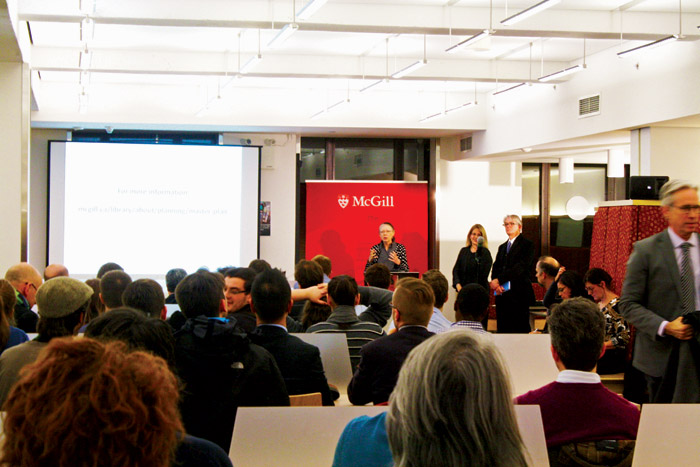Students, faculty, and staff were invited to a Town Hall meeting last Tuesday to discuss their priorities for the future of the McLennan Library.Architects from architectural firms Shepley Bulfinch and EKM, who worked previously on Cybertheque and the Redpath Terrace, were also present.
Janette Blackburn from Shepley Bulfinch highlighted the latest trends in library conceptions. According to Blackburn, collections have become increasingly complex.
“Many libraries […] were conceived in an area where a library had three distinct pieces: How to find space for staff to do their work, how to create space for people to read and use collections, and how to house the collections themselves,” Blackburn said. “In the 21st century […] there is no single model of what a modern library should be as it changes through the wide range of activities it encompasses.”
According to Dean of Libraries Colleen Cook, the project is still in its preliminary stages.
“The university has contracted with architectural firms to do a feasibility study,” Cook explained in her introductory remarks. “Shepley Bulfinch has a deep experience working at universities and particularly imagining libraries at the sort of places that are our peers—MIT, John Hopkins, [and] Duke. They have a very deep experience in not only renovating heritage sites in large big cities, but all sorts of reimagining of library spaces.”
Redpath Hall Organ
The planned repurposing of the Redpath Hall was also discussed at the Town Hall.
“[The feasibility study will] explore the repatriation of the iconic Redpath Hall as a dedicated reading room befitting a major academic library; a space which will serve as the Library’s centrepiece while also functioning as an event and exhibit room,” the library master plan and preliminary documents read.
Students and faculty members attended the meeting to ask for clarifications regarding the impact of the library master plan on the future of Redpath Hall and the French classical pipe organ that the Hall currently houses. Robert Doucet, stage manager for Redpath Hall, argued that the library master plan’s statement that the hall is under-used was inaccurate. Doucet stated that Redpath Hall is heavily used for book fairs, rehearsals, recordings, and various ceremonies.
“We are all very concerned about the perspective of this space being change dacoustically or being taken away,” added Martha de Francisco, professor of sound recording.
The library master plan was consequently revised through a message from Cook published on the library’s website on Nov. 11.
“[It] is clear that the iconic and cherished Redpath Hall is a preeminent venue for performance and study,” Cook said in the message. “It is also a very important event space to the McGill community. For the Library, Redpath Hall is part of our history [….] The above statement is misleading because it refers to a dedicated reading room. At this point, we want to confirm that it cannot, and will not, be a dedicated reading room. It serves numerous uses now and will in the future, and options will be explored with different university constituencies to best serve all of the community’s needs.”
She continued to state that the original wording would be modified to no longer include the phrase regarding reading rooms, but to explore Redpath Hall to serve as a multipurpose space.
The architects explained that the complexity of moving the organ and adapting the room makes any change very unlikely. They added that many modern libraries include performance spaces and this inclusion brings positive experiences to users.
“You can’t have a reading room in a space that is acoustically designed for organ performances because it would be too resonant,” Blackburn said. “The two acoustics are at odds with each other [.…] It was never in my mind to have the space literally shared.”
Libraries and Heritage
Peter McNally, professor at the School of Information Studies and director of the History of McGill Project, spoke extensively at the meeting on the significance of the library complex. He also stressed the importance of including the existing design elements into the project.
“This wing of the Redpath building is considered to be one of the outstanding examples of post World War II modernism,” McNally said. “I would suggest [taking] these historical and aesthetic elements into consideration and [considering] these buildings as historical objects.”
Audience members voiced skepticism as to the likelihood of the library project to move forward, given the recent budgetary cuts to universities announced by the Quebec government.
“We have heard a lot of things on budget reductions,” Joel Peters, U3 Music and Arts student said. “How is it feasible to begin a new project extremely ambitious [given this]?”
According to Cook, projects of this magnitude are financed differently than daily operations and the project will still be moving forward.
“I think it is a duty of leadership for an institution to, even when financial times are difficult, continue to look towards the future, and to have plans and aspirations in place so that when they are possible, they can be moved forward,” Blackburn added. “Otherwise, you can’t keep a place relevant and vibrant.”








